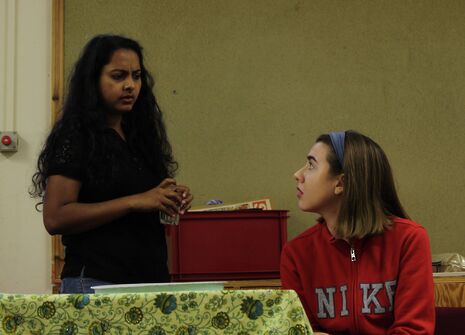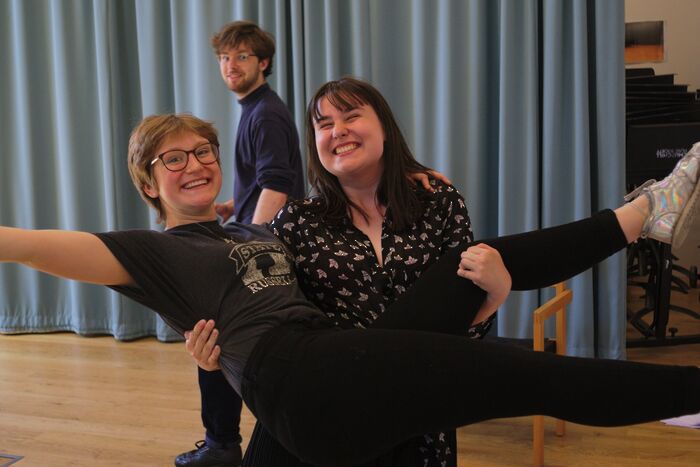Next To You I Lie preview: “complex characters held in fragile equilibrium”
A devised show focusing on conflict, naivety, and disillusionment

In a tiny room in Murray Edwards smelling of paint, with a tablecloth-covered cardboard box functioning as a makeshift kitchen table, something incredible is unfolding.
This play is about nudity, female nudity, and the problems created by the naked female body on the pages of men’s magazines. Devised in 1989 by ‘Trouble and Strife’, a women’s theatre company founded by students of New Hall (now Murray Edwards) with the explicit aim of producing work “by, for and about women”, Next To You I Lie stages the conflict between the daughter’s desire for empowerment and the mother’s protective instinct, between freedom and confidence in one’s own body and the distorting and objectifying male gaze. When Juliet chooses to pursue a career as a Page Three model, with all of the dirty steps that lead her there, the audience are made to see the decision in the context of close family surroundings, to listen to the views of her best friend and her mother. We are forced to see both sides of the issue.
Privileging the female narrative does not exclude the masculine role as both aggressor and victim
The directors Alice Tyrrell and Isla Waring have worked on the script that was handed down to them, most significantly adding in monologues for the other three characters who did not previously have them. This fleshes the characters out to make this a balanced four-person show, but also fundamentally amplifies the different opinions, empowering the positives of Juliet’s decision as well as the negatives which played a more central part in the original script, turning this play away from a sermon against women in porn and towards more of a balanced conflict. The monologues were written by the directors in consultation with the cast, becoming therefore a conversation not just between the women of ‘Trouble and Strife’ in 1989 but also between the women performing in the Murray Edwards bar in 2018.
And what does this 2018 vision give the play? The world now is both better and worse, Alice describes. On the one hand our society celebrates women embracing their bodies; on the other the internet offers us violent porn that we can hardly avoid, porn pushed onto us by adverts rather than in the pages of a magazine picked from the top shelf. Women are objectified in front of our eyes every day, and the conversation about porn and its effect on relationships is very familiar.
But the play is not just about objectified women. The beauty of the writing is that privileging the female narrative does not exclude the masculine role as both aggressor and victim. There are no male characters, no male actors on the stage, and the masculine in this play is anonymous. This does not just mirror the way in which men can hide behind the pages of these pornographic magazines, it also deprives women of someone at whom they can point a finger, a representative to blame or an anomaly to celebrate. A man in the script would ruin its subtlety, the cast explain, would ignore the sense which cannot be discarded in this play: that women, Elly and even maybe Juliet, are part of this problem. When Sian judges her best friend for modelling, she relates to the story through her problems with her boyfriend which have been catalysed by these magazines, by the photographs which alter his vision of her and stop their tongues when they try to talk about love. These are problems which affect both men and women. As she tells Juliet: “This isn’t about love, or even sex. It’s about hate. It’s about disgust.”
The main challenge in rehearsing this play has been in bringing out the complexity of these characters who cannot be symbolised by a single emotion, who are not black and white but held in their own fragile equilibriums. We see character arcs, not character sketches. They must balance naivety and disillusionment, pitching themselves against each other as villain and angel in patterns which turn with almost every line. Conflict thrives in this play, and the ending does not offer us a resolution. If there is to be change, these women seem to say, there must first be open conversation.
Next To You I Lie is on at Murray Edwards Bar, 13 - 15 June
 Features / Are you more yourself at Cambridge or away from it? 27 January 2026
Features / Are you more yourself at Cambridge or away from it? 27 January 2026 News / Vigil held for tenth anniversary of PhD student’s death28 January 2026
News / Vigil held for tenth anniversary of PhD student’s death28 January 2026 Interviews / Lord Leggatt on becoming a Supreme Court Justice21 January 2026
Interviews / Lord Leggatt on becoming a Supreme Court Justice21 January 2026 News / Reform candidate retracts claim of being Cambridge alum 26 January 2026
News / Reform candidate retracts claim of being Cambridge alum 26 January 2026 Comment / How Cambridge Made Me Lose My Faith26 January 2026
Comment / How Cambridge Made Me Lose My Faith26 January 2026










